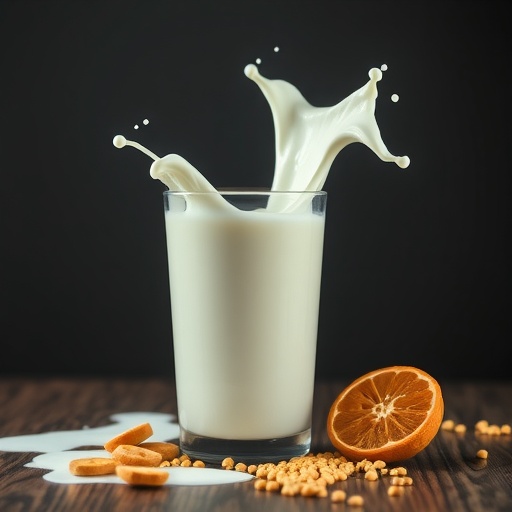In a groundbreaking study that delves into the complex biochemical intersections between maternal health and infant nutrition, researchers have unveiled significant alterations in milk tryptophan levels and its metabolic derivatives in women living with HIV. The study, recently published in Nature Communications, sheds new light on the nuanced ways in which chronic viral infections influence breast milk composition, with profound implications for infant development and immune system maturation.
Tryptophan, an essential amino acid pivotal in protein synthesis and precursor to critical neuroactive and immunomodulatory metabolites, is a focal point in understanding maternal-infant health dynamics. The researchers embarked on a meticulous analysis of breast milk samples from women living with HIV, comparing them with healthy controls to uncover the biochemical impacts of viral infection on tryptophan homeostasis and metabolic pathways operative within mammary secretions.
Their findings reveal a marked disruption in the concentration of tryptophan and its catabolites in the breast milk of HIV-positive mothers. More precisely, the study documents a notable shift in the kynurenine pathway metabolites, suggesting an upregulation of indoleamine 2,3-dioxygenase (IDO) activity, an enzyme intricately tied to immune regulation and inflammation. This enzymatic modulation could represent an adaptive or pathological response, aiming to control viral replication yet simultaneously altering the nutritional and immunological profile conveyed to the nursing infant.
The implications of altered tryptophan metabolism extend beyond nutritional deficits, touching on neurodevelopmental and immunological outcomes for breastfed infants. Tryptophan metabolites, via the kynurenine pathway, are instrumental in shaping immune tolerance and neural function. Dysregulation in these metabolites during the critical postnatal period may predispose infants to an array of neuropsychiatric and immunological disorders, a hypothesis that warrants urgent further investigation.
Significantly, the study employs advanced metabolomic techniques, including high-resolution mass spectrometry and targeted biochemical assays, to delineate the precise shifts in metabolite profiles. This comprehensive approach allowed the team to quantify subtle yet biologically meaningful changes in the spectrum of tryptophan derivatives, including kynurenine, quinolinic acid, and other downstream molecules that mediate inflammatory and neuroactive effects.
The role of the IDO enzyme emerges as a central theme in the altered milk composition observed. IDO activity, often induced by interferon-gamma in response to viral antigens, accelerates tryptophan catabolism along the kynurenine axis, producing metabolites that possess immunosuppressive and neurotoxic potential. This enzyme’s upregulation in mammary gland tissue during HIV infection may reflect an immune-privileged strategy but simultaneously deprives the infant of vital tryptophan molecules necessary for normal growth and brain development.
Furthermore, the study explores the correlation between viral load and metabolite concentrations, revealing that higher levels of HIV RNA in maternal plasma correspond with more pronounced alterations in milk tryptophan metabolism. This correlation underscores the delicate balance between viral control and host nutritional status, suggesting that effective antiretroviral therapy, beyond viral suppression, may need to consider preserving optimal breast milk chemistry.
Intriguingly, these metabolic changes appear independent of maternal nutritional status or systemic inflammation markers, indicating a specific virus-driven effect rather than a generalized physiological impairment. This delineation is crucial as it focuses attention on immunometabolic pathways directly influenced by HIV infection in the lactating mammary gland environment.
The research team hypothesizes that the altered breast milk metabolome could affect infant gut microbiota, immune education, and even susceptibility to infections or chronic conditions later in life. As tryptophan metabolites like indole derivatives serve as key modulators of gut epithelial integrity and microbial populations, their imbalance could have cascading effects on the developing infant’s health trajectory.
Additionally, the report touches upon potential interventions to mitigate these biochemical disruptions. Nutritional supplementation with tryptophan or modulating IDO activity through pharmacological means may emerge as viable strategies to correct metabolic imbalances in breast milk, thereby enhancing infant outcomes in populations affected by HIV.
This study also sets the stage for broader exploration of how chronic maternal infections modulate breast milk composition and the subsequent health effects on children. It challenges existing paradigms by positioning breast milk as a dynamic, immunologically active fluid whose biochemical signature is sensitive to systemic viral infections beyond mere nutritional content.
Given the global burden of HIV and the reliance on breastfeeding as a crucial public health strategy, these findings carry immense weight. They compel healthcare providers and researchers alike to rethink maternal-infant health frameworks and integrate metabolic assessments into comprehensive care plans for HIV-positive mothers.
The study’s multidisciplinary methodology, combining virology, immunology, biochemistry, and neonatal health perspectives, exemplifies the integrative approach needed to unravel the complexities of maternal-infant microbial-immune interactions. By harnessing cutting-edge metabolomic technologies, the authors have opened new frontiers in understanding how viral infections perturb critical maternal resources.
Moreover, the implications of altered tryptophan metabolism extend beyond HIV. Since many infectious and inflammatory diseases upregulate IDO activity, the biochemical changes described could represent a common mechanistic thread affecting breast milk quality across various maternal health conditions. This broader perspective invites further comparative studies across different diseases and populations.
In conclusion, this seminal research heralds a new era in maternal-infant health sciences by illustrating how the metabolic signature of breast milk is intricately shaped by maternal HIV infection. The nuanced interplay between viral pathogenesis, enzymatic activity, and metabolite fluxes in milk reveals a complex biochemical dialogue influencing infant development and immunity. Future investigations will undoubtedly build upon these findings to devise targeted nutritional and therapeutic interventions, aiming to optimize maternal milk composition and improve health outcomes for millions of infants worldwide battling the enduring challenges posed by HIV.
Subject of Research: Alterations in breast milk tryptophan and tryptophan metabolites in women living with HIV and their implications for infant health.
Article Title: Altered milk tryptophan and tryptophan metabolites in women living with HIV.
Article References:
Tobin, N.H., Li, F., Zhu, W. et al. Altered milk tryptophan and tryptophan metabolites in women living with HIV. Nat Commun 16, 9437 (2025). https://doi.org/10.1038/s41467-025-64566-w
Image Credits: AI Generated




